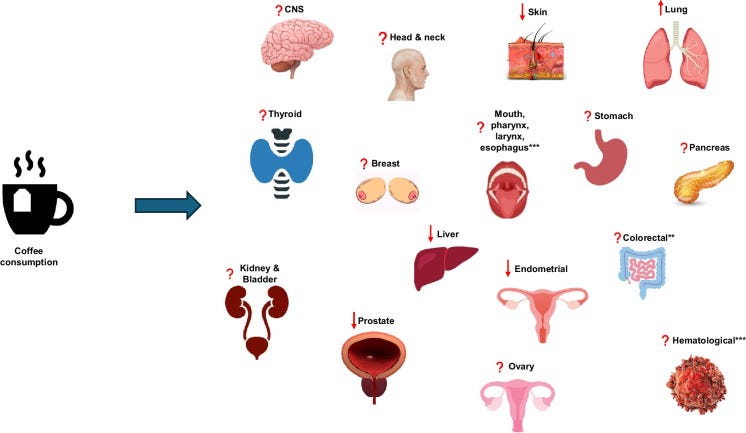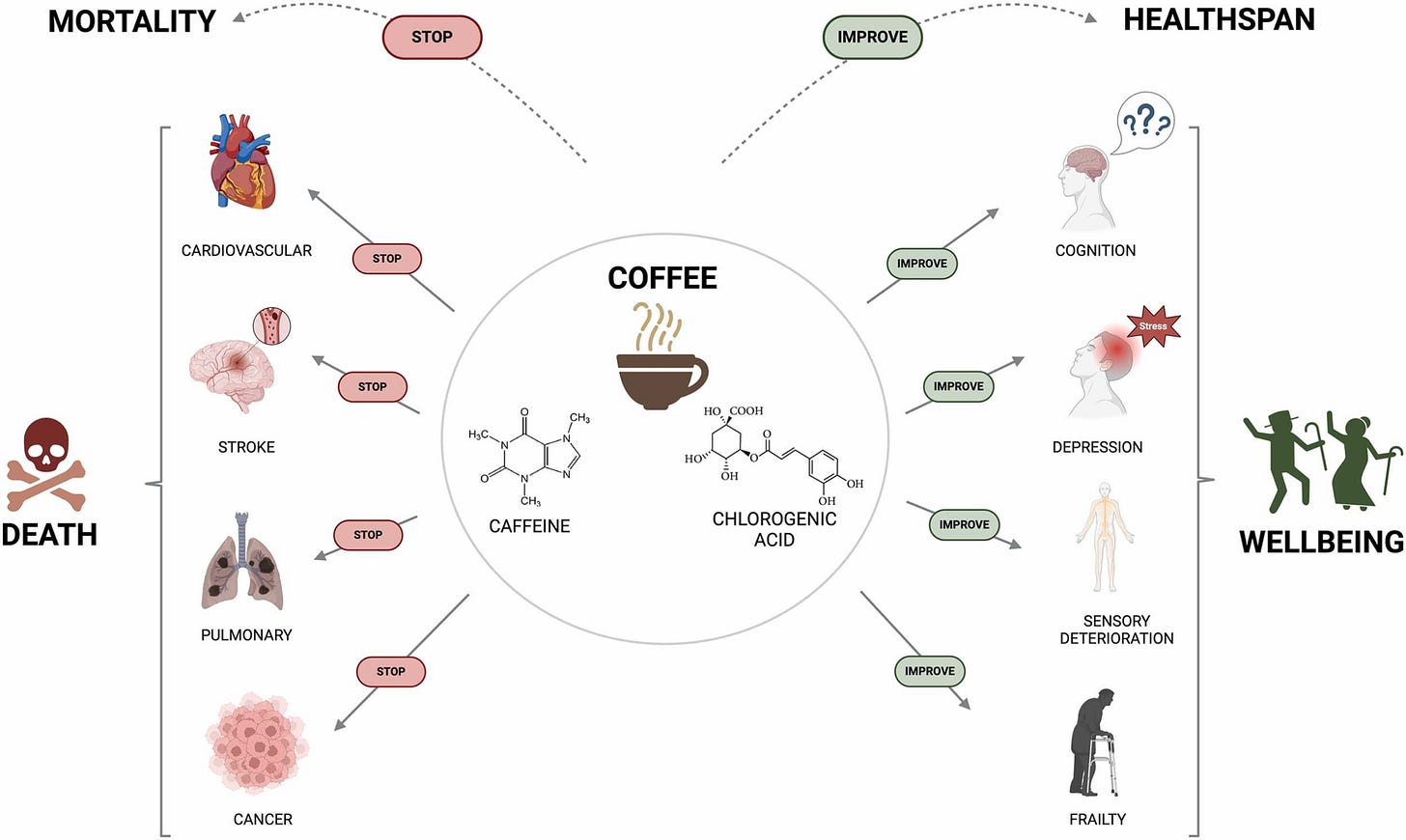One of the biggest questions in everyone’s mind is whether coffee consumption is healthy. I mean, it tastes great, it helps performance, it’s social the list goes on, surely there must be a downside?! It’s certainly a handy heuristic to keep, but like all heuristics, they are generally helpful and ‘correct’ but there are specific situations where they won’t be and this looks to be one of them. Increasing evidence is suggesting that coffee is helpful when it comes to aging and longevity.
For those who are yet to read my previous article (one of my most popular) on coffee in the health and performance realm make sure you go check that out for best ways to brew, insights into health effects, potential negatives of coffee amongst other interesting insights (does coffee actually make us need to go to the toilet?) about one of the world’s favourite beverages.
There seems to have been a run of coffee related research released recently, much of it pertaining to aging and longevity. I can’t be sure why, though it’s helpful to research a popular beverage and the world is certainly aging and longevity obsessed at the moment so it’s smart for the scientists (maybe that’s enough explanation).
It is worth noting, that like many dietary (and lifestyle in general) related studies much of the research ends up being observational and often retrospective. The point here is the evidence isn’t particularly strong, because it’s hard to be sure about the data. That shouldn’t discourage folks, particularly if the numbers are big and the signal is strong, but it’s worth making this point none the less.
Coffee Consumption and Frailty
A recent study used data from the Longitudinal Aging Study Amsterdam (LASA). The LASA is like many other cohorts I have written about, a large group is enrolled to be part of a study, significant information about them is gathered and they are followed up for a period of time. This gives relatively helpful data from a cohort point of view and yields many insights (and thus papers).
In this case, the LASA cohort was used to discern the association between coffee consumption in midlife and frailty in later years. In this case the study consisted of 1161 community-dwelling older adults (≥ 55 years). A questionnaire was used to asses midlife (ages 40–65) coffee consumption and the participants were divided into five categories (no coffee, > 0–2, > 2–4, > 4–6, > 6 cups/day). The group and their subsequent frailty, or pre-frailty (don’t ask me), was followed for 7 years.
The group of non-coffee drinkers AND 0-2 cups per day were used as the control group (they needed to use both as people who didn’t drink coffee were rare unsurprisingly).
What Was Seen?
People who consumed more coffee: > 4–6 cups (1 cup = 125 mL) and > 6 cups per day was associated with lower odds of frailty compared with consumption of > 0–2 cups/day.
It’s worth remembering that we are talking about association rather than causation and even if we were seeing a causative effect (it’s related to study design), we’d still struggle to understand exactly what was driving this. Remember, coffee is more than brown caffeine, and it’s healthfulness depends greatly on brew methods, beans etc. (see my above coffee article if this interests you).
Coffee and Biological Aging
I seem to be writing about biological aging (and biological clocks) a lot recently. Of course these are very popular right now and they’re about as good as we have for measuring aging so this shouldn’t be a surprise I guess. If you’re unfamiliar, I explained them briefly here.
In a similar type of study design to the one above - pull subjects from a large group, in this caseNational Health and Nutrition Examination Survey (NHANES) data, evaluate their coffee consumption via a questionnaire and then follow them. In this case, ‘following’ was actually testing them using biological age tests. Based on inclusion criteria, 13 384 participants were included, their average daily coffee consumption was 1.73 cups.
I want to highlight a CRUCIAL passage from the authors that was even in the abstract: “Participants with higher coffee consumption tended to be older, male, non-Hispanic white; had a higher educational level beyond high school; were more likely to be married; had better financial status; and were less likely to smoke or engage in excessive drinking.”
Why is this important? Because aside from being male and and older, EVERY other factor mentioned is associated with better health and longevity. This perfectly highlights the challenge with association in research studies. But I digress.
What Was Seen?
Those with higher coffee consumption showed a younger biological age with respect to their chronological age. Coffee intake was found to be inversely related to biological age progression as well as to chances of accelerated biological aging.
These associations were consistent across ages and genders. However, there was some heterogeneity with respect to these findings when broken into physical activity and body mass index (BMI) categories. Again, this shouldn’t surprise anyone - those factors are likely magnitudes more impactful to aging than coffee consumption.
Coffee Consumption, Cancer and Healthy Aging
One, hot off the press, review looked more specifically at the links between coffee and cancer, one of the major causes of death in the developed world. It also sought to understand the mechanisms of these links (quite similar to another study below in some ways).
The headline here is that cancer risk is generally reduced by coffee consumption (at least up to a moderate amount).
Below is a great summary of the links between coffee consumption and different types of cancers. Readers will swiftly notice, for the most part, we aren’t sure. This is likely due to the complex nature of any dietary intervention on human metabolism.

Lung Cancer
What jumped out to me, and probably others, is the increase in lung cancer risk. There is no suggestion as to why this may be the case, though one study found that this impact was not present for decaffeinated coffee (whilst was present for caffeinated coffee, so perhaps there’s a hint there). Studies generally controlled for smoking status (a huge driver in lung cancer and regularly associated with coffee drinking). The risk increase was around 14%, which it should be remembered is a RELATIVE RISK increase (I covered risk changes and base rates extensively in this article). In short, 14% increase from a low number is still a low number so I will remain a coffee drinker given I am at a very low lung cancer risk.
How Does Coffee Help?
As is visualised below, there are a number of effects from coffee that may play a role in its healthful effects. Specifically, authors also suggest these aid in prevention of recurrence of cancers.

Authors’ Conclusions
Reduced risk of cancer was generally consistent across different age and sex groups and geographical locations.
Protective effects were most pronounced with the consumption of three or more cups of coffee per day.
Lung cancer risk should be evaluated and balanced - those at higher risk may want to avoid coffee.
Authorities should consider adding coffee into dietary guidelines (PREACH!!!)
Coffee and Facial Skin Aging
Something I hadn’t come across until recently was the research on coffee and skin aging. There’s a non-insignificant amount (I shouldn’t be surprised but it just isn’t where my head is at apparently), but a 2024 study is probably the strongest of the lot.
The study looked at various drinks (including tea, coffee and sugar sweetened beverages aka SSBs) and their impact on facial skin aging. It used a technique called “mendelian randomization” (I won’t go into it, but its a method of randomising genetic differences of interest to understand the intervention better without doing a prospective trial).
I won’t labour the point, but coffee intake was associated with reduced skin aging, whereas the others were not. Somewhat surprisingly, perhaps, the SSBs were not shown to worsen skin aging (at least statistically).
The Impact of Coffee on Human Aging
A wonderful (and thorough) review article, covered the epidemiology (a lot of articles similar to the above) and some cellular mechanisms of coffee and aging. The latter giving insight into some of the potential ‘why’ behind the associations that the epidemiology is bearing out. Basically, an attempt to hint at some causality. Of course, ideally, we’d like to see the causality too but sometimes it’s just too hard (good luck controlling coffee intake in people, not to mention the other factors over the required timeline which is probably decades).
There’s no way to do real justice to the whole article in a piece like this, but I will pull out some highlights that I found interesting.
One aspect the article tried to tease out was which component of coffee was driving the impact. Interestingly, the article split mortality and healthspan (length of healthy life) apart (there’s of course a significant interaction) but none the less it’s an interesting way to split the impacts of different compounds apart as is visualised below (FYI chlorogenic acid is a polyphenol in coffee).

As mentioned the article looked to ascertain the molecular mechanisms behind the associations between longevity/aging and coffee, as a means to start to understand any causation. As detailed in the diagram below, coffee has pluripotent effects with some more significant (larger arrows) than others.

Perhaps the most interesting portion of the article for readers is the quantification of benefits of coffee. Specifically:
There is a J shaped curve to mortality, with discrete benefits seen after consumption of 1 cup of coffee a day and the maximal benefits yielded by 3 cups a day.
There was a 15 % lower likeliness of dying during the observed period of studies which corresponded to about 1.8 years of increase lifespan.
*Reading the paper, it seems as though there may be a mistake or differing of definitions given the 1.8 years is actually LIFEspan (not HEALTHspan as suggested in the abstract) added - that is 1.8 extra years of life rather than increasing the health portion of life by 1.8 years - it’s a subtle but important difference.
The take home messages from the review are probably summed by the authors with their highlights from the paper:
The regular consumption of moderate doses of coffee attenuates all-cause mortality
Coffee intake attenuates age-associated diseases (cardiovascular, stroke, cancer)
Coffee and its main components (caffeine, chlorogenic acids) control stress adaptation
Coffee intake preserves the main biological mechanisms of aging
So go forth and enjoy your coffee consumption, at least in moderation. It looks like it’s probably good for you. I would caution people to consider their sleep in this, there’s research suggesting caffeine intake is a real problem in some folks if it is consumed after around midday. I myself am trying to find the time to do a month off caffeine (not coffee - I will be on the decaf) to help reset my sensitivity a little and improve my sleep - but that’s an article for a different day.
References
van der Linden M, Wijnhoven HAH, Schaap LA, Hoogendijk EO, Olthof MR. Habitual coffee consumption and risk of frailty in later life: the Longitudinal Aging Study Amsterdam (LASA). Eur J Nutr. 2025 Apr 24;64(4):164. doi: 10.1007/s00394-025-03683-0. PMID: 40274674; PMCID: PMC12021940.
Chen X, Yin X, Gao Y, Chen X, Ye N, He X. From cup to clock: exploring coffee's role in slowing down biological aging. Food Funct. 2024 May 20;15(10):5655-5663. doi: 10.1039/d3fo04177h. PMID: 38726849.
Kunutsor SK, Lehoczki A, Laukkanen JA. Coffee consumption, cancer, and healthy aging: epidemiological evidence and underlying mechanisms. Geroscience. 2025 Apr;47(2):1517-1555. doi: 10.1007/s11357-024-01332-8. Epub 2024 Sep 13. PMID: 39266809; PMCID: PMC11978573.
Liu X, Li X, Ma J. Beverage consumption and facial skin aging: Evidence from Mendelian randomization analysis. J Cosmet Dermatol. 2024 May;23(5):1800-1807. doi: 10.1111/jocd.16153. Epub 2024 Jan 4. PMID: 38178620.
Lopes CR, Cunha RA. Impact of coffee intake on human aging: Epidemiology and cellular mechanisms. Ageing Res Rev. 2024 Dec;102:102581. doi: 10.1016/j.arr.2024.102581. Epub 2024 Nov 16. PMID: 39557300.
Gardiner CL, Weakley J, Burke LM, Fernandez F, Johnston RD, Leota J, Russell S, Munteanu G, Townshend A, Halson SL. Dose and timing effects of caffeine on subsequent sleep: a randomized clinical crossover trial. Sleep. 2025 Apr 11;48(4):zsae230. doi: 10.1093/sleep/zsae230. PMID: 39377163; PMCID: PMC11985402.




